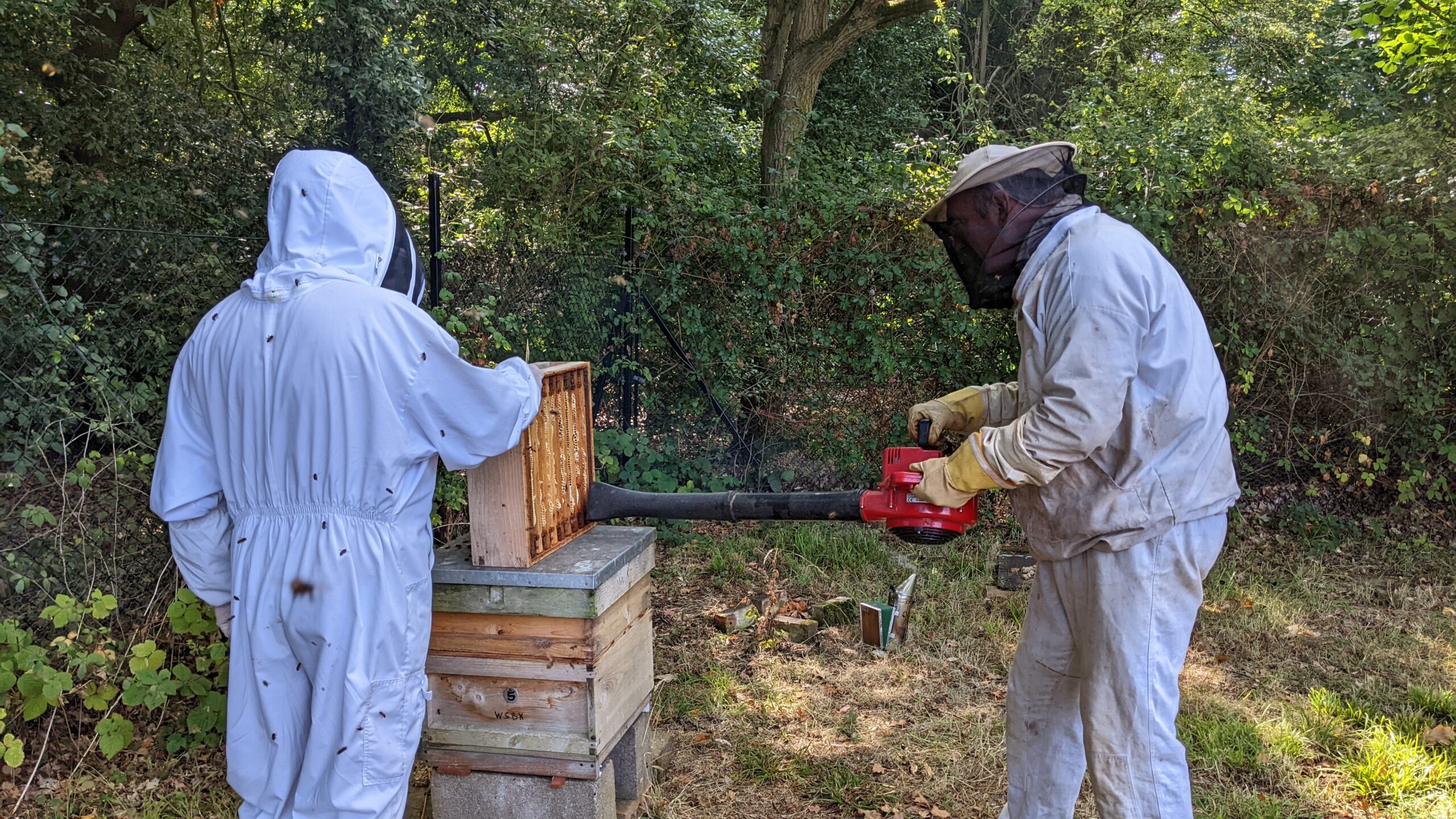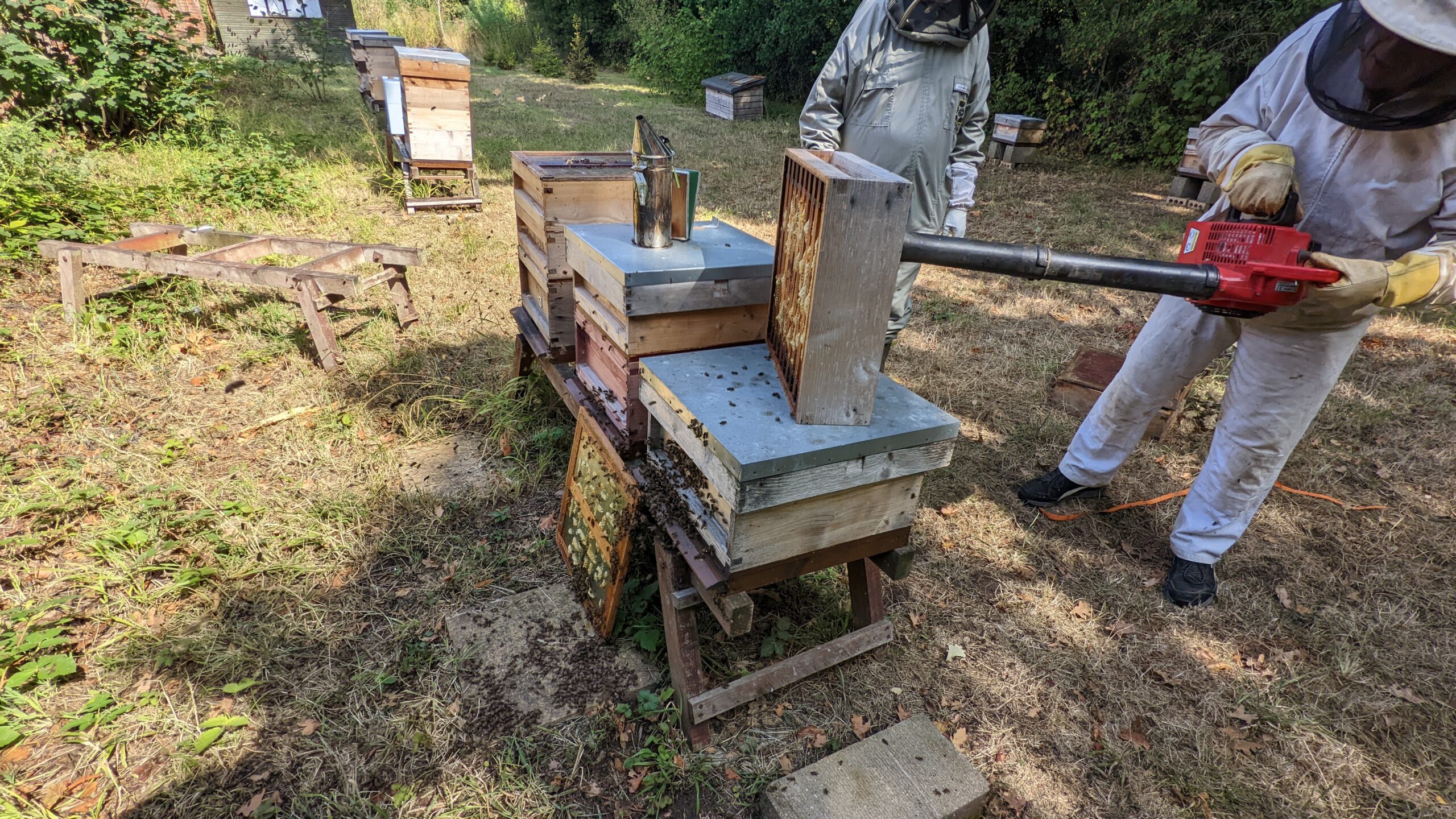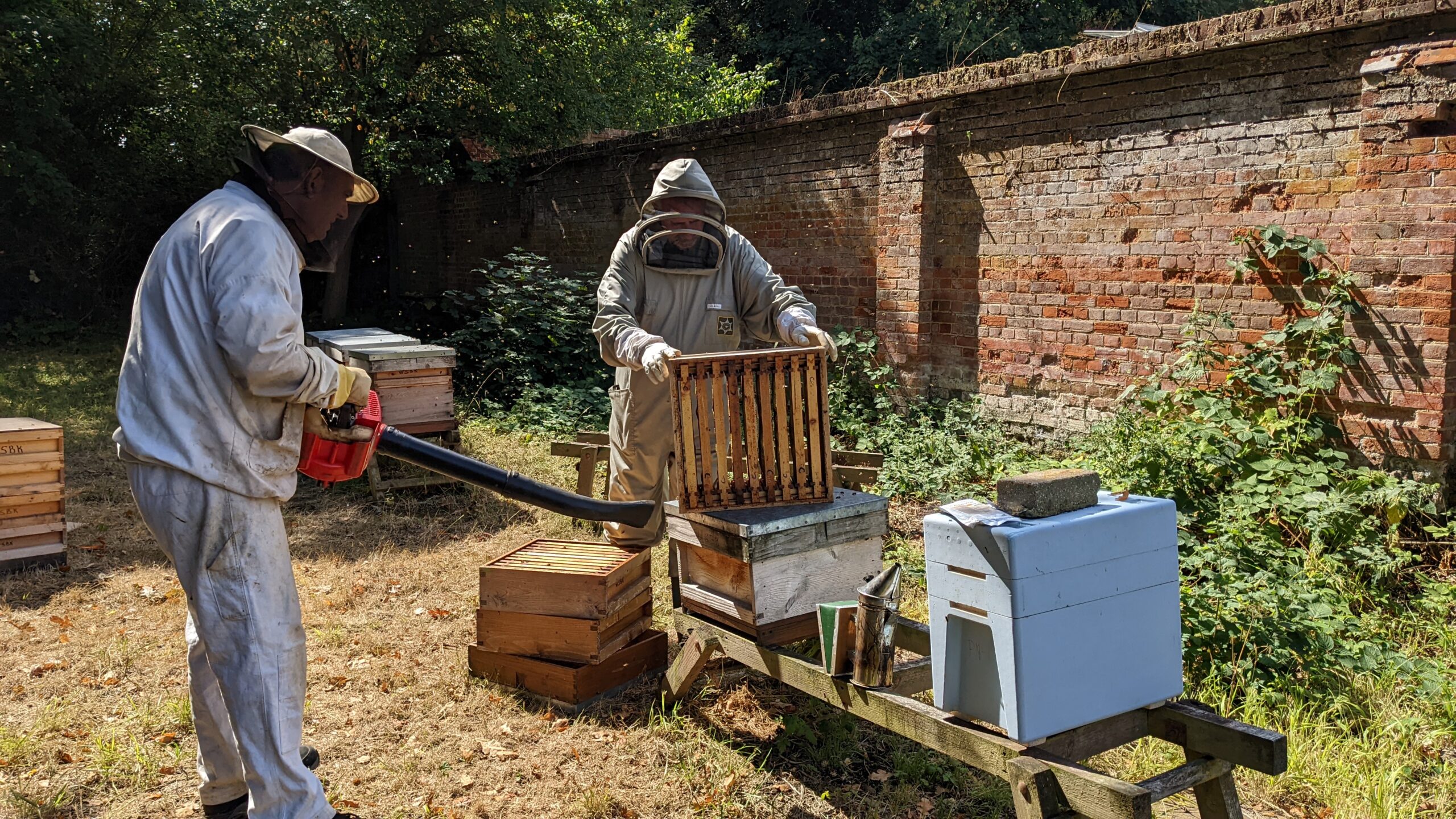- .
- On warmer days the bees will be flying. Do not go into the hive until at least 15 degrees or the weather is really settled . March can be warm in the day but temperatures still plummet at night.
- If you have fondant on the colony, check if the bees are still taking it down.
- Flowers may not produce nectar until towards the end of the month, so you may still need to feed.
- The bees may be bringing in pollen from the snowdrops, crocus, hazel and willow among other plants. This can indicate the queen is laying
- If a colony does not appear as active as others, keep a close check on stores and check when the temperature allows .
- Continue to remove dead bees from the entrance and when the temperature is around 15 degrees on a warm windless day you can change the floor.
- Do not do any other manipulation .
- Once the weather has settled above 15 degrees you can do your first inspection to see the state of the stores and brood. Do this as quickly as possible.
- If you find a colony has died out block the entrance to prevent robbing.
- If the bees died with heads in the cells it was most likely starvation . In case of disease remove the hive and wash equipment with strong soda solution and scorch the hive parts.
- Change tools and gloves if inspecting another colony..
- At the first full inspection you will need to do a health check. This may be March or April depending on the weather.
- In preparation insert the varroa board the week before to ascertain the mite drop.. You can check whether to treat with the NBU mite calculator.
- At the first check you may find your queen has been superseded late last year.. if so you might want to mark and clip. the new one .
- Get ahead by preparing for the possibility of swarming .
- If you intend to change combs think about moving these to the edge of the hive, for a Bailey comb change or shook swarm when the temperature is settled at night as well as day .
- Remove mouseguards..
- Put Asian hornet traps in place. with some kind of sugary mixture such as apple juice. . Monitor daily and ensure you release other pollinators.
This Month in the Apiary: February
- Continue to heft to check stores. Feed fondant if in doubt.
- If feeding fondant, check if it needs replacing and that it’s over the cluster. You may have to rotate the crownboard so the hole is closer to the bees.
- Look under the hive to locate the cappings as an indication of where the cluster is.
- Clear dead bees from the entrance.
- Check hives are secure and undamaged.
- Observe on warmer days to see if the bees are flying. If not remove roof. Bees should come up to the crownboard hole to the light if it’s warm enough.
- Check and repair stored equipment.
- Make up frames ready for the season for comb change, swarms or splits. Don’t place foundation until nearer the time needed.
- Check records and plan for season ahead.
- Purchase anything needed.
This Month in the Apiary: January
- Monitor varroa levels by putting the board in for a few days. More than 2 a day means it would be a good idea to treat.
- In cold weather the bees cluster, two weeks of low temperatures allow for oxalic treatment if the colony is broodless- only use an approved treatment and record its use.
- If temperatures are above freezing the colony could be active and using more stores, look under the hive for where the cappings have dropped.
- Continue to heft and check stores and if in doubt put fondant in a container over the crownboard hole.
- Ensure the entrance is clear of dead bees and should it snow clear the entrance or landing board.
- Insulating the roof will help prevent condensation.
- High winds can blow hives or roofs over, consider strapping down or putting a weight on the roof.
- Clean and repair any equipment left from the season to avoid being taken by surprise.
- Think ahead and purchase any new equipment required.
- Plan what you want to do in the new season, catch up on reading and join one of the many webinars available.
This Month in the Apiary: September
- Varroa treatment should have been completed. Note treatments are temperature dependent and may be less effective as temperatures drop.
- Unite small healthy colonies or unite to stronger ones.
- Assess stores. Nationals need approximately 40lbs /18kg of stores feeding should be finished by mid -September. ( A brood frame holds 5lb/2.3kg, supers 3lbs/1.4kg).
- Feed 2:1 syrup. feed all colonies in the evening at the same time to avoid robbing. Avoid spillages or clean up.
- Reduce entrances against wasps, plug with sponge down to one bee space.
- heck all equipment is sound with no gaps for wasps to get in. Continue to have monitoring traps out. Asian hornets will be looking for carbohydrate/ sugar. Keep an eye out as the ivy comes in or in traps.
- Extracted super combs can either be put in freezer for 24 hours or use 80% acetic acid to kill wax moth larvae.
- Scorch boxes especially in corners before replacing frames.
- Store supers stacked with paper between once treated. Combs with pollen are more prone to wax moth.
- If your brood box is already full of stores and there is a good ivy flow, consider putting a super of foundation on to let strong colonies draw it.
- Clear debris and grass etc from under hives to avoid damp.
Having a super time!*
4 of us taking the supers off for extraction at the apiary today: the leaf blower might seem a little brutal at first but actually it doesn’t harm the bees at all and is significantly more efficient than using clearer boards. We also started the Varrora treatments (Apivar this year).
*This, by the way, is an excellent pun and I will not hear any arguments otherwise!
Apiary Sunday 14th August- Closed
I had planned a meeting based on uniting colonies this Sunday.
Due to the very hot weather I feel this is better postponed.
Look at the posts for a revised meet date.
End of season apiary sessions
As the season starts to draw to a halt so things at the apiary have slowed down too. We’ll not be generally open each Sunday from now (August) but there will still be some open sessions you’ll be very welcome to attend:
Removing Supers
Uniting colonies
Applying Varroa treatments
Feeding for winter
Look out for times/dates of those sessions here, on the Facebook group and via email.

Apiary not open Sunday the 24th
Just a quick note to say that the association apiary will not be open this Sunday 24th of July 2022, due to a clash with the annual Bee Safari. Please do sign up to that event if you have not already and we look forward to seeing you at the apiary on Sunday the 31st.
Sunday 10th July 1400 – Introducing a Queen
Come along to Nowton Park Apiary this Sunday where we will be looking at the Nucs we set up two weeks ago to see how our queen cells have faired. Do we have newly mated queens to clip and mark?
We will go on to introduce a Queen to an existing colony. You might want to do this if your colony temper is poor, your queen is failing or you want to move to a low swarming high productivity strain of bees. This is possibly the hardest beekeeping task you will carry out as a beekeeper so lets see how we can make it easier and increase our chances of success.
Remember we always finish with cake and a chat or catch up
Nowton Park Apiary open from 12:00 every Sunday
The Nowton Park apiary will now be open to experienced beekeepers and novices alike, from 12:00 every Sunday. Please do come along to help out with the inspections, brush up on skills, share your experiences, get advice and meet up with fellow members for a chin-wag!
Complete beginners and members of the public are also welcome but please do contact us first via the website, our Facebook Group or by emailing wsbka@yahoo.co.uk





